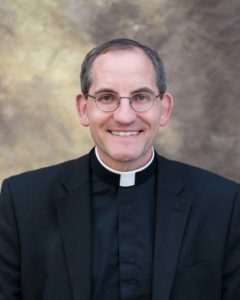
In my homily for Christmas, I mentioned that I had recently purchased a Christmas gift for myself, a Nativity Set that I have in my personal quarters in the Cathedral Rectory. When agonizing over which set to purchase, one of the final conditions I had was that I wanted the set to include the Magi, as they completed the scene of the birth of Jesus.
Over the past couple of weeks, I have been re-reading Pope Benedict’s third volume on Jesus of Nazareth which focuses on the Infancy Narratives. When he gets to the section on the question of who the Magi are, he offers a helpful description which I would like to share:
Just as the Church’s tradition read the Christmas story quite spontaneously in the light of Is 1:3, with the result that the ox and the ass found their way into the crib, so too the Magi story was read in conjunction with Ps 72:10 and Is 60. Hence the wise men from the East became kings, and with them camels and dromedaries were added to the crib.
While the prophetic content of these texts expands the provenance of these figures to include the extreme west (Tarshish = Tartessos in Spain), tradition has further developed this idea of universality by conceiving them as kings from all three known continents: Africa, Asia, and Europe. The black king is part and parcel of this: in the kingdom of Jesus Christ there are no distinctions of race and origin. In him and through him, humanity is united, yet without losing any of the richness of variety.
Later, the three kings came to be associated with the phases of human life—youth, maturity, and old age. This too makes good sense, highlighting the fact that each of the various stages of human life finds its true meaning and its inner unity in companionship with Jesus.
The key point is this: the wise men from the east are a new beginning. They represent the journeying of humanity toward Christ. They initiate a procession that continues throughout history. Not only do they represent the people who have found the way to Christ: they represent the inner aspiration of the human spirit, the dynamism of religions and human reason toward him.
(Pope Benedict XVI, Jesus of Nazareth – The Infancy Narratives, p. 96-97)
These Magi serve as a beautiful reminder of what we experience when we come to Mass. When we come to this church, we come to Bethlehem (which translated means house of bread). We come as being one family, without distinction, while retraining our variety. We come at every stage of our lives. We come to encounter Christ, to encounter a new beginning in our loving Him and others more and more as He feeds us with the gift of His life in the Eucharist.
Father Alford